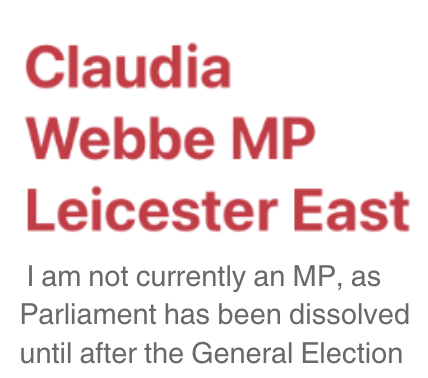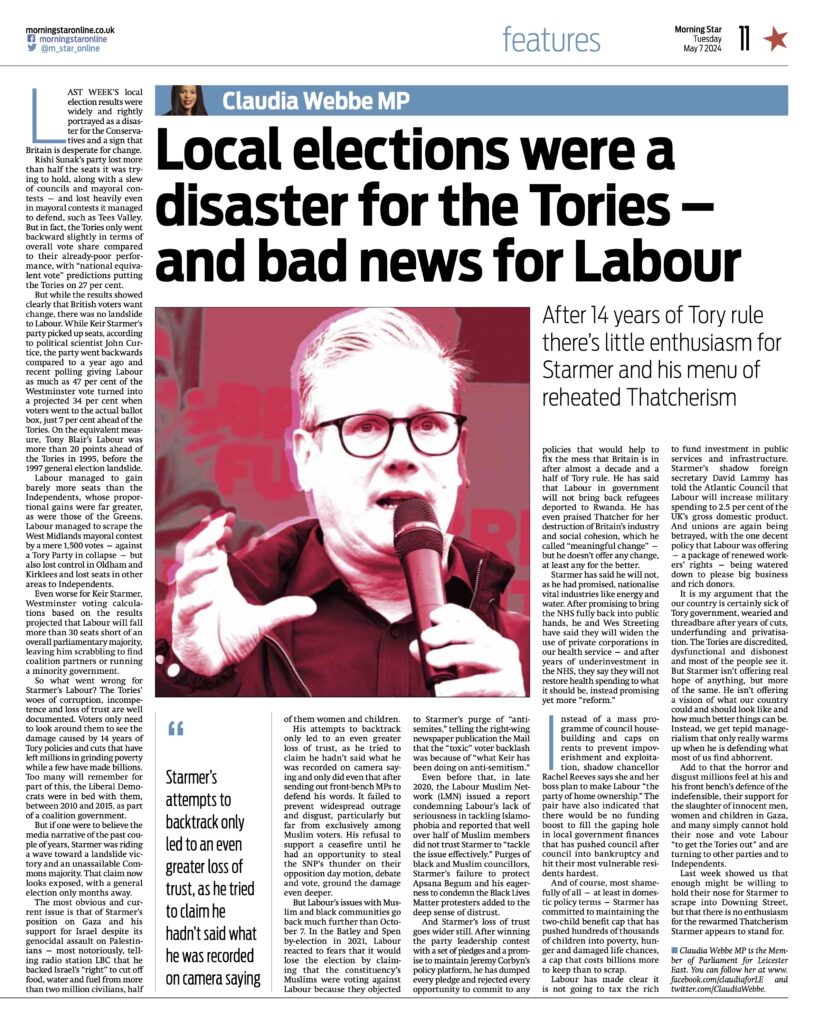Local elections were a disaster for the Tories – and bad news for Labour
By Claudia Webbe MP
After 14 years of Tory rule there’s little enthusiasm for Starmer and his menu of reheated Thatcherism, writes CLAUDIA WEBBE
LAST WEEK’S local election results were widely and rightly portrayed as a disaster for the Conservatives and a sign that Britain is desperate for change.
Rishi Sunak’s party lost more than half the seats it was trying to hold, along with a slew of councils and mayoral contests — and lost heavily even in mayoral contests it managed to defend, such as Tees Valley. But in fact, the Tories only went backward slightly in terms of overall vote share compared to their already-poor performance, with “national equivalent vote” predictions putting the Tories on 27 per cent.
But while the results showed clearly that British voters want change, there was no landslide to Labour. While Keir Starmer’s party picked up seats, according to political scientist John Curtice, the party went backwards compared to a year ago and recent polling giving Labour as much as 47 per cent of the Westminster vote turned into a projected 34 per cent when voters went to the actual ballot box, just 7 per cent ahead of the Tories. On the equivalent measure, Tony Blair’s Labour was more than 20 points ahead of the Tories in 1995, before the 1997 general election landslide.
Labour managed to gain barely more seats than the Independents, whose proportional gains were far greater, as were those of the Greens. Labour managed to scrape the West Midlands mayoral contest by a mere 1,500 votes — against a Tory Party in collapse — but also lost control in Oldham and Kirklees and lost seats in other areas to Independents.
Even worse for Keir Starmer, Westminster voting calculations based on the results projected that Labour will fall more than 30 seats short of an overall parliamentary majority, leaving him scrabbling to find coalition partners or running a minority government.
So what went wrong for Starmer’s Labour? The Tories’ woes of corruption, incompetence and loss of trust are well documented. Voters only need to look around them to see the damage caused by 14 years of Tory policies and cuts that have left millions in grinding poverty while a few have made billions. Too many will remember for part of this, the Liberal Democrats were in bed with them, between 2010 and 2015, as part of a coalition government.
But if one were to believe the media narrative of the past couple of years, Starmer was riding a wave toward a landslide victory and an unassailable Commons majority. That claim now looks exposed, with a general election only months away.
The most obvious and current issue is that of Starmer’s position on Gaza and his support for Israel despite its genocidal assault on Palestinians — most notoriously, telling radio station LBC that he backed Israel’s “right” to cut off food, water and fuel from more than two million civilians, half of them women and children.
His attempts to backtrack only led to an even greater loss of trust, as he tried to claim he hadn’t said what he was recorded on camera saying and only did even that after sending out front-bench MPs to defend his words. It failed to prevent widespread outrage and disgust, particularly but far from exclusively among Muslim voters. His refusal to support a ceasefire until he had an opportunity to steal the SNP’s thunder on their opposition day motion, debate and vote, ground the damage even deeper.
But Labour’s issues with Muslim and black communities go back much further than October 7. In the Batley and Spen by-election in 2021, Labour reacted to fears that it would lose the election by claiming that the constituency’s Muslims were voting against Labour because they objected to Starmer’s purge of “anti-semites,” telling the right-wing newspaper publication the Mail that the “toxic” voter backlash was because of “what Keir has been doing on anti-semitism.”
Even before that, in late 2020, the Labour Muslim Network (LMN) issued a report condemning Labour’s lack of seriousness in tackling Islamophobia and reported that well over half of Muslim members did not trust Starmer to “tackle the issue effectively.” Purges of black and Muslim councillors, Starmer’s failure to protect Apsana Begum and his eagerness to condemn the Black Lives Matter protesters added to the deep sense of distrust.
And Starmer’s loss of trust goes wider still. After winning the party leadership contest with a set of pledges and a promise to maintain Jeremy Corbyn’s policy platform, he has dumped every pledge and rejected every opportunity to commit to any policies that would help to fix the mess that Britain is in after almost a decade and a half of Tory rule. He has said that Labour in government will not bring back refugees deported to Rwanda. He has even praised Thatcher for her destruction of Britain’s industry and social cohesion, which he called “meaningful change” — but he doesn’t offer any change, at least any for the better.
Starmer has said he will not, as he had promised, nationalise vital industries like energy and water. After promising to bring the NHS fully back into public hands, he and Wes Streeting have said they will widen the use of private corporations in our health service — and after years of underinvestment in the NHS, they say they will not restore health spending to what it should be, instead promising yet more “reform.”
Instead of a mass programme of council housebuilding and caps on rents to prevent impoverishment and exploitation, shadow chancellor Rachel Reeves says she and her boss plan to make Labour “the party of home ownership.” The pair have also indicated that there would be no funding boost to fill the gaping hole in local government finances that has pushed council after council into bankruptcy and hit their most vulnerable residents hardest.
And of course, most shamefully of all — at least in domestic policy terms — Starmer has committed to maintaining the two-child benefit cap that has pushed hundreds of thousands of children into poverty, hunger and damaged life chances, a cap that costs billions more to keep than to scrap.
Labour has made clear it is not going to tax the rich to fund investment in public services and infrastructure. Starmer’s shadow foreign secretary David Lammy has told the Atlantic Council that Labour will increase military spending to 2.5 per cent of the UK’s gross domestic product. And unions are again being betrayed, with the one decent policy that Labour was offering — a package of renewed workers’ rights — being watered down to please big business and rich donors.
It is my argument that the our country is certainly sick of Tory government, wearied and threadbare after years of cuts, underfunding and privatisation. The Tories are discredited, dysfunctional and dishonest and most of the people see it. But Starmer isn’t offering real hope of anything, but more of the same. He isn’t offering a vision of what our country could and should look like and how much better things can be. Instead, we get tepid managerialism that only really warms up when he is defending what most of us find abhorrent.
Add to that the horror and disgust millions feel at his and his front bench’s defence of the indefensible, their support for the slaughter of innocent men, women and children in Gaza, and many simply cannot hold their nose and vote Labour “to get the Tories out” and are turning to other parties and to Independents.
Last week showed us that enough might be willing to hold their nose for Starmer to scrape into Downing Street, but that there is no enthusiasm for the rewarmed Thatcherism Starmer appears to stand for.
Claudia Webbe MP is the member of Parliament for Leicester East. You can follow her at www.facebook.com/claudiaforLE and twitter.com/ClaudiaWebbe



